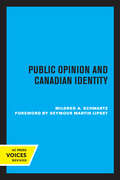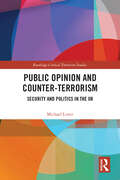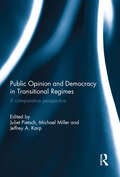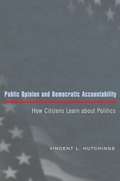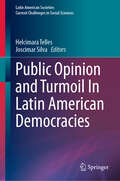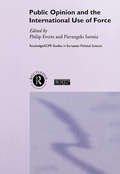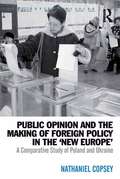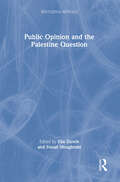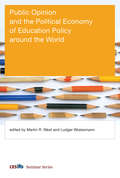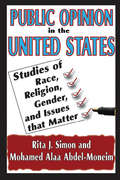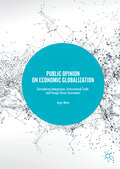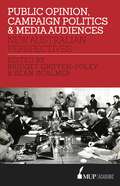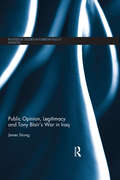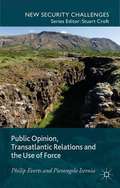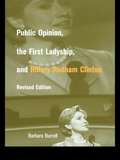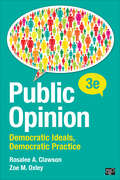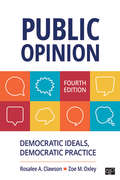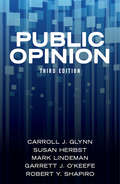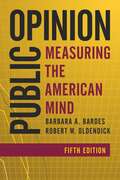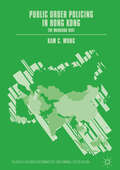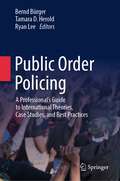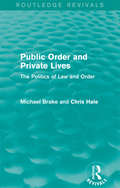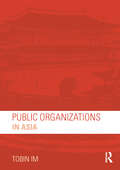- Table View
- List View
Public Opinion and Canadian Identity
by Mildred A. SchwartzThis title is part of UC Press's Voices Revived program, which commemorates University of California Press’s mission to seek out and cultivate the brightest minds and give them voice, reach, and impact. Drawing on a backlist dating to 1893, Voices Revived makes high-quality, peer-reviewed scholarship accessible once again using print-on-demand technology. This title was originally published in 1967.
Public Opinion and Counter-Terrorism: Security and Politics in the UK (Routledge Critical Terrorism Studies)
by Michael ListerThis book examines the ways in which the views of the public inhabit the counter-terrorism policy space, with a focus on the UK case. Drawing insights from Critical Terrorism Studies, Critical Security Studies and studies of public opinion, the book develops an argument that the relationship between public opinion is complex, iterative and mutually instantiating. Rather than public opinion and counter-terrorism policy existing in a simple, uni-directional causal relationship, the book argues that whilst counter-terrorism policy actors are informed by public opinion, in important ways they also construct that very opinion. This argument is made through an empirical analysis of UK counter-terrorism policy. Drawing on primary research interviews with key counter-terrorism policy actors, and security professionals, as well as original analysis of parliamentary debates, the book demonstrates that rather than UK counter- terrorism politics being closed and elite-driven, there exists a complex, dialectical relationship between public opinion and both the making and the implementing of counter-terrorism policy. This book will be of much interest to students of critical terrorism studies, counter-terrorism, security studies, British politics and communication studies.
Public Opinion and Democracy in Transitional Regimes: A Comparative Perspective
by Juliet Pietsch, Michael Miller and Jeffrey A. KarpDespite the enthusiasm surrounding the Colour Revolutions and the Arab Spring, the world’s share of democracies has stagnated over the past 15 years. The steady rise of China, Russia, and Iran has also led to warnings of a resurgence of "authoritarian great powers", especially in light of the financial crisis centred in the USA and Western Europe. On the positive side, however, democracy remains remarkably popular as an ideal. In the Global barometer’s most recent survey, two out of three respondents say democracy is their most favoured political system, including a majority in 49 of the 55 countries. Yet there is evidence, much expanded upon in this edited collection, that commitments to liberal democracy in practice are not as strong. Nominally pro-democratic citizens frequently favour limitations on electoral accountability and individual rights in the service of improved governance or economic growth. Further, there are rising concerns that many citizens, especially across the developing world, are turning away from democracy out of frustration with democratic performance. In contrast to many transitional regimes, the more established democracies appear to be losing support among their highly educated citizens. The contributions in this edited collection compare how democracy is understood and experienced in transitioning regimes and established democracies. This book was published as a special issue of the Journal of Elections, Public Opinion and Parties.
Public Opinion and Democratic Accountability: How Citizens Learn about Politics
by Vincent L. HutchingsMuch of public opinion research over the past several decades suggests that the American voters are woefully uninformed about politics and thus unable to fulfill their democratic obligations. Arguing that this perception is faulty, Vincent Hutchings shows that, under the right political conditions, voters are surprisingly well informed on the issues that they care about and use their knowledge to hold politicians accountable. Though Hutchings is not the first political scientist to contend that the American public is more politically engaged than it is often given credit for, previous scholarship--which has typically examined individual and environmental factors in isolation--has produced only limited evidence of an attentive electorate. Analyzing broad survey data as well as the content of numerous Senate and gubernatorial campaigns involving such issues as race, labor, abortion, and defense, Hutchings demonstrates that voters are politically engaged when politicians and the media discuss the issues that the voters perceive as important. Hutchings finds that the media--while far from ideal--do provide the populace with information regarding the responsiveness of elected representatives and that groups of voters do monitor this information when "their" issues receive attention. Thus, while the electorate may be generally uninformed about and uninterested in public policy, a complex interaction of individual motivation, group identification, and political circumstance leads citizens concerned about particular issues to obtain knowledge about their political leaders and use that information at the ballot box.
Public Opinion and Turmoil In Latin American Democracies (Latin American Societies)
by Helcimara Telles Joscimar SilvaThis book analyzes the impacts of growing political turmoil and distrust in democracy on public opinion, political communication and electoral behavior of Latin American citizens over the first two decades of the 21st century. During this period, Latin American’s young democracies, which were in the process of consolidation, have faced a number of unresolved challenges, such as growing distrust in representative institutions and the judiciary, anti-system protests, the emergence of radical right groups and the election of outsiders and populist leaders. At the same time, Latin American citizens became more suspicious of corporate communication channels and started to trust more in information from social media, while scientific denialism and support to the Armed Forces and to religious groups have also grown. The rise of new right-wing and left-wing forces in Latin America, along with the proliferation of populist leaders from various ideological camps, have produced informational reconfigurations, with the strengthening of digital social media as an important source of political information and disinformation. All these processes have deeply affected public opinion and political behavior in the region, making election campaigns more polarized, radicalized and based on false messages, while the electorate also has gone through major changes, becoming more independent of parties, less young, more religious and with a greater presence of women. Public Opinion and Turmoil in Latin American Democracies analyzes how political turbulence, sociodemographic changes and frustration with the unfulfilled promises of the democratic regimes inaugurated in the last decades of the 20th century have produced important transformations on public opinion that deeply reshaped political behavior leading to an unprecedented crisis of democracy across the region.
Public Opinion and the International Use of Force (Routledge/ECPR Studies in European Political Science)
by Philip Everts Pierangelo IserniaRecent years have witnessed a growing interest in the relationship between public opinion and foreign policy in Western democracies. This international board of contributors examine the ways in which the connection between public opinion and the use of military force has developed since the end of the Cold War. In doing so, it also addresses the crucial and topical question of whether, and to what extent a democratic foreign policy is possible.
Public Opinion and the Making of Foreign Policy in the 'New Europe': A Comparative Study of Poland and Ukraine (Post-Soviet Politics)
by Nathaniel CopseyBy drawing a new boundary between the EU and its eastern neighbours, the European Union has since 1989 created a frontier that has been popularly described in the frontier states as the new 'Berlin Wall'. This book is the first comparative study of the impact of public opinion on the making of foreign policy in two Eastern European states on either side of the divide: Poland and Ukraine. Focusing on the vocal, informed segment of public opinion and drawing on results of both opinion polls and a series of innovative focus groups gathered since the Orange Revolution, Nathaniel Copsey unravels the mystery of how this crucial segment of the public impacts on foreign policy makers in both states. He also takes a closer look at the business community and the importance of economic factors in forming public opinion. The book presents a fresh approach to our understanding of how the public's view of the past influences contemporary politics.
Public Opinion and the Palestine Question (Routledge Revivals)
by Elia Zureik Fouad MoughrabiPublic Opinion and the Palestine Question (1987) analyses public opinion on the Palestinian–Israeli conflict. It studies attitudes in various Western democratic countries and Israel, and examines whether the governments of those countries reflect the general positions on the issue of their people. It shows important changes taking place in the orientations of Western public opinion on the Palestinian question.
Public Opinion and the Political Economy of Education Policy around the World (CESifo Seminar Series)
by Martin R. West and Ludger WoessmannComparative analyses of the influence of public opinion on education policy in developed countries.Although research has suggested a variety of changes to education policy that have the potential to improve educational outcomes, politicians are often reluctant to implement such evidence-based reforms. Public opinion and pressure by interest groups would seem to have a greater role in shaping education policy than insights drawn from empirical data. The construction of a comparative political economy of education that seeks to explain policy differences among nations is long overdue. This book offers the first comparative inventory and analysis of public opinion and education in developed countries, drawing on data primarily from Europe and the United States.
Public Opinion in the United States: Studies of Race, Religion, Gender, and Issues That Matter
by Rita J. SimonPublic Opinion in the United States tracks developments in American society since World War II through the lens of public opinion. The authors assess national public opinion poll data from 1945 to 2008, targeting opinions about African Americans, Jews, Muslim Americans, gays and lesbians, immigration, abortion, and affirmative action. The authors consider whether American attitudes have developed faster than Supreme Court decisions in the areas surveyed. They assess how social change is processed by the public, how people responded to the race riots of the 1950s and 1960s, and how the war in Vietnam shaped new perspectives on issues such as race, citizenship rights, and the role of the individual. Each chapter begins by introducing the political, social, or international events that were critical in setting the stage for influencing public opinion in each decade since World War II. The volume provides a unique portrait of American society and how it has changed over the last sixty plus years. The reader will learn whether Americans are more or less prejudiced against blacks, Jews, and Muslims than they were in earlier years; whether their views on immigration, affirmative action, and abortion have changed; and when views have changed, in what direction. Do men and women, rich and poor, more and less educated, secular versus religious share the same views? And if there are differences, what directions do those differences take? Th is work describes American society in 2008 compared to the post-World War II era, and it offers stunning glimpses at the future.
Public Opinion on Economic Globalization
by Roger WhiteThis book examines survey data to consider the extent to which public support for immigration, international trade, and foreign direct investment exists in a cohort of 38 heterogeneous countries. With economic globalization shaping daily life, understanding the determinants of public opinion is crucial for policy makers. This timely volume uses survey data from the Pew Research Center's 2006-2014 Global Attitudes Project (GAP) in conjunction with data from several secondary sources. White identifies the factors that underlie the reluctance of some members of the public, and some societies, to view these topics in a more positive light. Specifically, he considers the roles of culture, cultural differences ("cultural distance"), and relative social and economic development as determinants of public opinion and corresponding cross-societal differences of opinion.
Public Opinion, Campaign Politics & Media Audiences: New Australian Perspectives
by Bridget Griffen-Foley Associate Professor Sean ScalmerThis timely book investigates the fascinating landscape of media-driven politics through the prisms of 'public opinion', political campaigning, and audiences.From Indigenous voting rights and climate change to talkback radio and right-wing populism, Public Opinion, Campaign Politics & Media Audiences showcases new research in political science, history and media studies. Contributors scrutinise the relationship between polls, party policy and voting behaviour, and evaluate the roles of oratory and the media in electioneering and political communication across Australia, Britain and the United States.The eight chapters are based on papers delivered at a symposium to honour Murray Goot FASSA, Emeritus Professor of Politics and International Relations, on his retirement from Macquarie University.
Public Opinion, Legitimacy and Tony Blair’s War in Iraq (Routledge Studies in Foreign Policy Analysis)
by James StrongIn the wake of the publication of the Chilcot report, this book reinterprets the relationship between British public opinion and the Blair government’s decision-making in the run-up to the 2003 invasion of Iraq. It highlights how the government won the parliamentary vote and got its war, but never won the argument that it was the right thing to do. Understanding how, why and with what consequences Britain wound up in this position means understanding better both this specific case and the wider issue of how democratic publics influence foreign policy processes. Taking an innovative constructivist approach to understanding how public actors potentially influence foreign policy, Strong frames the debate about Iraq as a contest over legitimacy among active public actors, breaking it down into four constituent elements covering the necessity, legality and morality of war, and the government’s authority. The book presents a detailed empirical account of the British public debate before the invasion of Iraq based on the rigorous interrogation of thousands of primary sources, employing both quantitative and qualitative content analysis methods to interpret the shape of debate between January 2002 and March 2003. Also contributing to the wider foreign policy analysis literature, the book investigates the domestic politics of foreign policy decision-making, and particularly the influence public opinion exerts; considers the domestic structural determinants of foreign policy decision-making; and studies the ethics of foreign policy decision-making, and the legitimate use of force. It will be of great use to students and scholars of foreign policy analysis, as well as those interested in legitimacy in international conflict, British foreign policy, the Iraq War and the role of public opinion in conflict situations.
Public Opinion, Transatlantic Relations and the Use of Force
by Philip Everts Pierangelo IserniaThis book explores the intersection of the study of transatlantic relationships and the study of public support for the use of force in foreign policy. It contributes to two important debates: one about the nature of transatlantic partnership, and another about the determinants of support for the use of military force in a comparative perspective.
Public Opinion, the First Ladyship, and Hillary Rodham Clinton (Women and Politics)
by Barbara BurrellThis second edition presents Clinton's self-repositioning during the 1996 election, her official role during the second term, her role during the impeachment proceedings, and the beginnings of an independent political career.
Public Opinion: Democratic Ideals, Democratic Practice
by Rosalee A. Clawson Zoe M. OxleyIn this revision of their lauded Public Opinion: Democratic Ideals, Democratic Practice, Rosalee A. Clawson and Zoe M. Oxley continue to link the enduring normative questions of democratic theory to the best empirical research on public opinion. Exploring the tension between ideals and their practice, each chapter focuses on exemplary studies so that students gain a richer understanding of key findings and the research process as well as see methods applied in context.
Public Opinion: Democratic Ideals, Democratic Practice
by Rosalee A. Clawson Zoe M. OxleyIn this revision of their lauded Public Opinion: Democratic Ideals, Democratic Practice, Rosalee A. Clawson and Zoe M. Oxley continue to link the enduring normative questions of democratic theory to the best empirical research on public opinion. Exploring the tension between ideals and their practice, each chapter focuses on exemplary studies so that students gain a richer understanding of key findings and the research process as well as see methods applied in context.
Public Opinion: Democratic Ideals, Democratic Practice
by Rosalee A. Clawson Zoe M. OxleyIn Public Opinion: Democratic Ideals, Democratic Practice, Fourth Edition, Clawson and Oxley link the enduring normative questions of democratic theory to existing empirical research on public opinion. Organized around a series of questions—In a democratic society, what should be the relationship between citizens and their government? Are citizens’ opinions pliable? Are they knowledgeable, attentive, and informed?—the text explores the tension between ideals and their practice. Each chapter focuses on exemplary studies, explaining not only the conclusion of the research, but how it was conducted, so students gain a richer understanding of the research process and see methods applied in context.
Public Opinion: Democratic Ideals, Democratic Practice
by Rosalee A. Clawson Zoe M. OxleyIn Public Opinion: Democratic Ideals, Democratic Practice, Fourth Edition, Clawson and Oxley link the enduring normative questions of democratic theory to existing empirical research on public opinion. Organized around a series of questions—In a democratic society, what should be the relationship between citizens and their government? Are citizens’ opinions pliable? Are they knowledgeable, attentive, and informed?—the text explores the tension between ideals and their practice. Each chapter focuses on exemplary studies, explaining not only the conclusion of the research, but how it was conducted, so students gain a richer understanding of the research process and see methods applied in context.
Public Opinion: How Political Actors View The Democratic Process (Studies In Communication, Media, And Public Opinion)
by Carroll J. GlynnPublic Opinion is a comprehensive and multidisciplinary examination of public opinion in the United States. Drawing on scholarship in political science, psychology, sociology, and communications, the authors explore the nature of political and social attitudes in the United States and how these attitudes are shaped by various institutions, with an emphasis on mass media. The book also serves as a provocative starting point for the discussion of citizen moods, political participation, and voting behavior. Feature boxes and illustrations throughout help students understand all aspects of the elusive phenomenon we call public opinion. The third edition has been thoroughly revised and updated to reflect how public opinion is studied today, and to incorporate current data and debates. The book now contains two revised and reframed theory chapters 'Group Membership and Public Opinion' and 'Public Opinion and Social Process', as well as new coverage of the influence of online and social media on public opinion, especially in issue opinions and campaigns.
Public Opinion: Measuring the American Mind
by Barbara Bardes Robert OldendickPublic Opinion: Measuring the American Mind provides an in-depth look at the history and future of polling, including how public opinion is measured, how it is used and misused, and how to critically evaluate public opinion data. This new edition incorporates a new theme of political polarization and examines how mass media and social media help to shape public opinion. It also provides in-depth coverage of public opinion on such issues as political ideology, health care, race, and foreign policy, as well as an update and discussion of the major changes that have taken place on controversial issues such as gay marriage, gun control, and immigration.
Public Order Policing in Hong Kong: The Mongkok Riot (Palgrave Advances in Criminology and Criminal Justice in Asia)
by Kam C. WongThis book examines the Hong Kong Mongkok Riot (MKR) of 2016 to offer a clear and objective account of the events as they unfolded, to dispel the myths, and to explore what can be learned from it. It draws on multiple sources including: public survey data, eyewitness accounts, LegCo proceedings, official press releases, newspaper reports, and video presentations. The study investigates the causes, issues and impacts of MKR including how the media reported it. It examines the historical context surrounding MKR, before and after, and considers the importance of this independent inquiry including its use and limitations. It aims to bring closure to the event, establish a record for the future, provide insightful data for cross-cultural studies on riots, and offer insights for police scholars, security consultants, political scientists, Asian and Chinese studies scholars, and comparative criminal justice researchers.
Public Order Policing: A Professional's Guide to International Theories, Case Studies, and Best Practices
by Ryan Lee Bernd Bürger Tamara D. HeroldSuccessful public order management is critical to upholding democracy and maintaining the rule of law. Negative police-public interactions during assemblies can impact the safety and well-being of citizens and officers, as well as local and international perceptions of police legitimacy. As observed during events across the world, including assemblies in the U.S., Myanmar, Belarus, Russia, and elsewhere, police mismanagement of mass demonstrations often instigates crowd violence and other harmful behaviors. The causes of violence at assemblies are complex and multi-faceted. Failure to understand crowd dynamics that lead to violence limits police effectiveness and contributes to poor officer decision-making. This book offers an international review of public order management experiences and effective practices. Practical examples, grounded in multi-disciplinary theory and science, offer a roadmap to improve police response and increase safety at assemblies in democratic countries. The diverse content, perspectives, and lessons learned presented in this volume will serve as a useful guide for all people working in the field of public order management, including police officials, policymakers, and researchers. This edited volume was written by and for practitioners, pracademics, and academics to review the complex and demanding task of policing public order.
Public Order and Private Lives: The Politics of Law and Order (Routledge Revivals)
by Chris Hale Michael BrakeFirst published in 1992, Public Order and Private Lives is a radical examination of the political forces which shaped the law and order debate in Britain at that time. The authors offer a significant and provoking analysis of Conservative policies on crime, showing that, ironically, they created the very social conditions in which crime flourished. The book argues that the Conservative government undermined basic civil liberties by its increased use of legislation as a means of control and coercion, and as a result of this, crime increased under their governance.
Public Organizations in Asia
by Tobin ImPublic Organizations in Asia introduces students to the fundamental theories of organizations and teaches them how to analyze different types of public organizations in East and Southeast Asia. Moving away from traditional Western theory and examples, this textbook provides numerous case studies of Asian organizations where different ideologies, administrative tradition, and social circumstances prevail. Key pedagogical features of Public Organizations in Asia include: Learning objectives for each chapter End of chapter discussion questions Short student exercises Concise case studies throughout the chapters Training students to be future leaders of Asian public organizations, this book is an essential text for undergraduate and graduate courses on public administration in Asia. It will also be a useful supplementary text for courses on comparative public administration.
